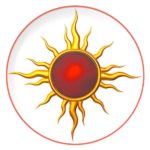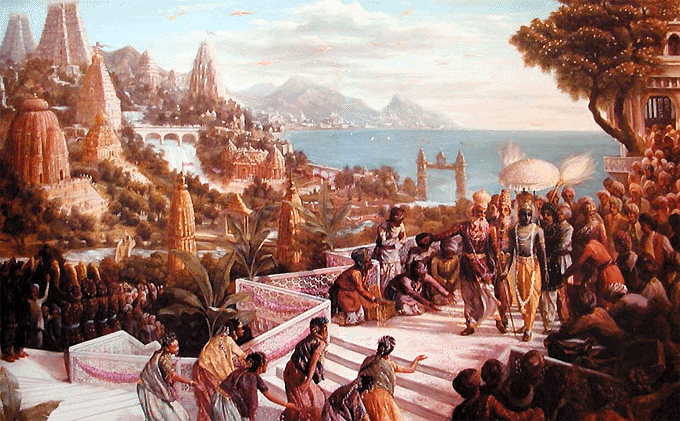The Mausala Parva or the Book of Clubs, is the 16th of the 18 books of the Mahabharata. It does not consist of any upa parvas and is one of the three shortest parvas of the 18 parvas. It consists of 9 chapters. The summary of the Mausala Parva is:
This Parva describes the events after 35 years of the Kurukshetra War. The kingdom of Hastinapura was prosperous and peaceful. In the thirty sixth year after the Kurukshetra war, Dwarka and its nearby cities started witnessing bad omens. The cities got infested with rats, great winds started blowing, owls were releasing horrifying sounds, and the women of the city started getting disturbing nightmares. Even the men were getting frightening dreams. Demons and evil souls started roaming around the city. Krishna was highly distressed with the condition of his city and asks everyone in Dwarka to go for a pilgrimage to the holy waters of the Prabhas Sea.
When the Yadavas arrived near the sea, they started celebrating, merry-making and drank lots of alcohol. Satyaki, who was inebriated with alcohol, went up to Krtavarma and started criticizing him for supporting Ashvatthama in his plan to kill the sleeping Pandava warriors. They enter into a very serious argument in their drunk state and in the heat of the moment, Satyaki killed Krtavarma. The other Yadavas, who were also drunk, killed Satyaki for his act. When Krishna arrived there, he was shocked to see Satyaki slain. Then, Krishna got angry and took a grass into his hand which miraculously turned into a club and he slayed the violent ones with the club. Even the other Yadavas pick up the grass, which turns into a club and they all attacked each other in their inebriated state. Everyone had died except Krishna, Daruka and Vabhru. Balarama had also survived as he was not drunk. Even Balarama and Vabhru died the next day.
Krishna sent Daruka to Hastinapura to inform Arjuna of the violent incident that destroyed everyone in the city. In the absence of Daruka, this Parva describes how Krishna was killed. He was killed by a hunter named Jara who mistook the meditating Krishna for a deer. Krishna forgave the hunter before dying.
Arjuna arrived with help for the remaining Yadavas. Arjuna, along with 16000 wives of Lord Krishna set off for Indraprastha. As they all left for Hastinapura, Dwarka sunk in the ocean behind them. By the time they left the city, all of Dwarka was submerged in the ocean. On their way back to Hastinapura, led by Arjuna, they were attacked by a group of robbers and dacoits. They looted the jewelry of the women and also abducted all the women. Arjuna could not fight them off even with his divine weapons. He only managed to save only a few wives of Krishna. It was same Arjuna that destroyed millions of warriors in Kurukshetra.
Arjuna met with Sage Vyasa and narrated him about the incident. Hethen told Arjuna that the objective of the Pandavas was fulfilled on Earth and even Lord Krishna had died. He explained the importance of change and advised them and the role Time plays. He told Arjuna that the Pandava brothers should give up their rule in the kingdom, pass it on the next generation and renounce all worldly pleasures. He said that the Pandavas should not lament on the death of
Krishna and understand the evolution of life and focus on the next phase of their lives, their journey to heaven. Arjuna understood the message and took leave from Vyasa to convey his message to Yudhishthira and the other Pandava brothers.

18 Parvas of Mahabharata
1. Adi Parva (the Beginning)
2. Sabha Parva (the Assembly Hall)
3. Vana Parva also Aranyaka-parva, Aranya-parva (the Forest)
4. Virata Parva (Virata)
5. Udyoga Parva (the Effort)
6. Bhishma Parva (Bhishma)
7. Drona Parva (Drona)
8. Karna Parva (Karna)
9. Shalya Parva (Shalya)
10. Sauptika Parva (the Sleeping Warriors)
11. Stri Parva (the Women)
12. Shanti Parva (Peace)
13. Anushasana Parva (the Instructions)
14. Ashvamedhika Parva (the Horse Sacrifice)
15. Ashramavasika Parva (the Hermitage)
16. Mausala Parva (the Clubs)
17. Mahaprasthanika Parva (the Great Journey)
18. Svargarohana Parva (the Ascent to Heaven)






